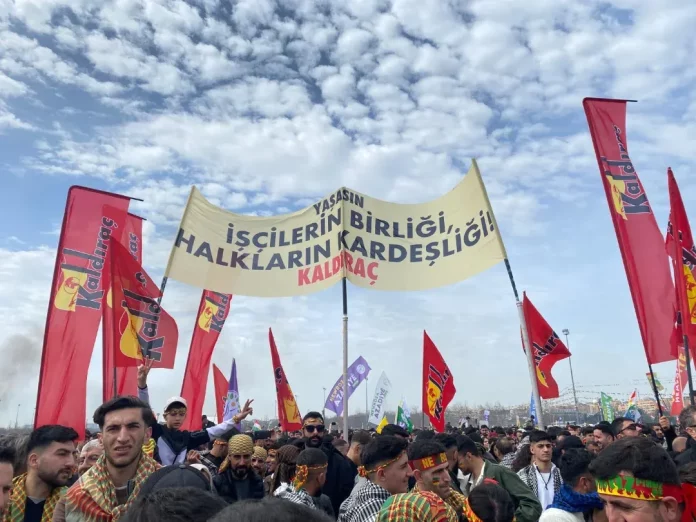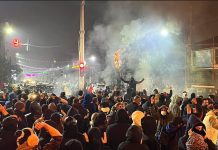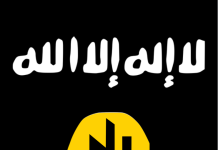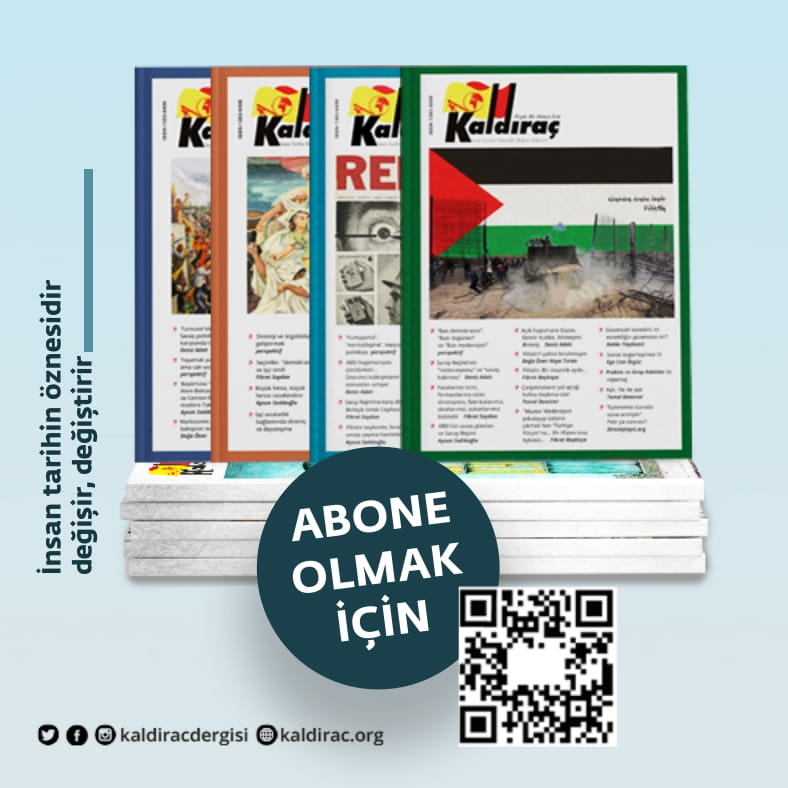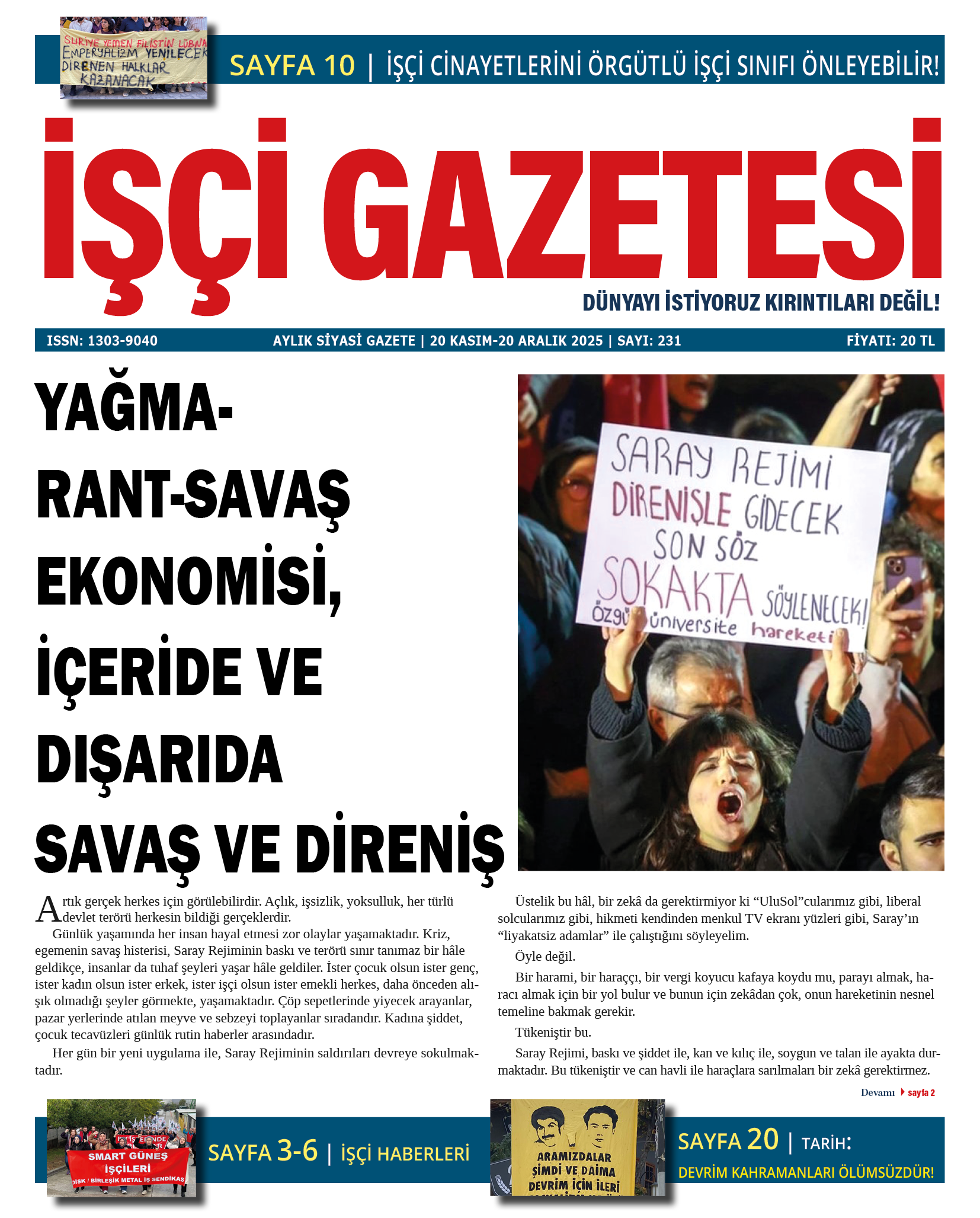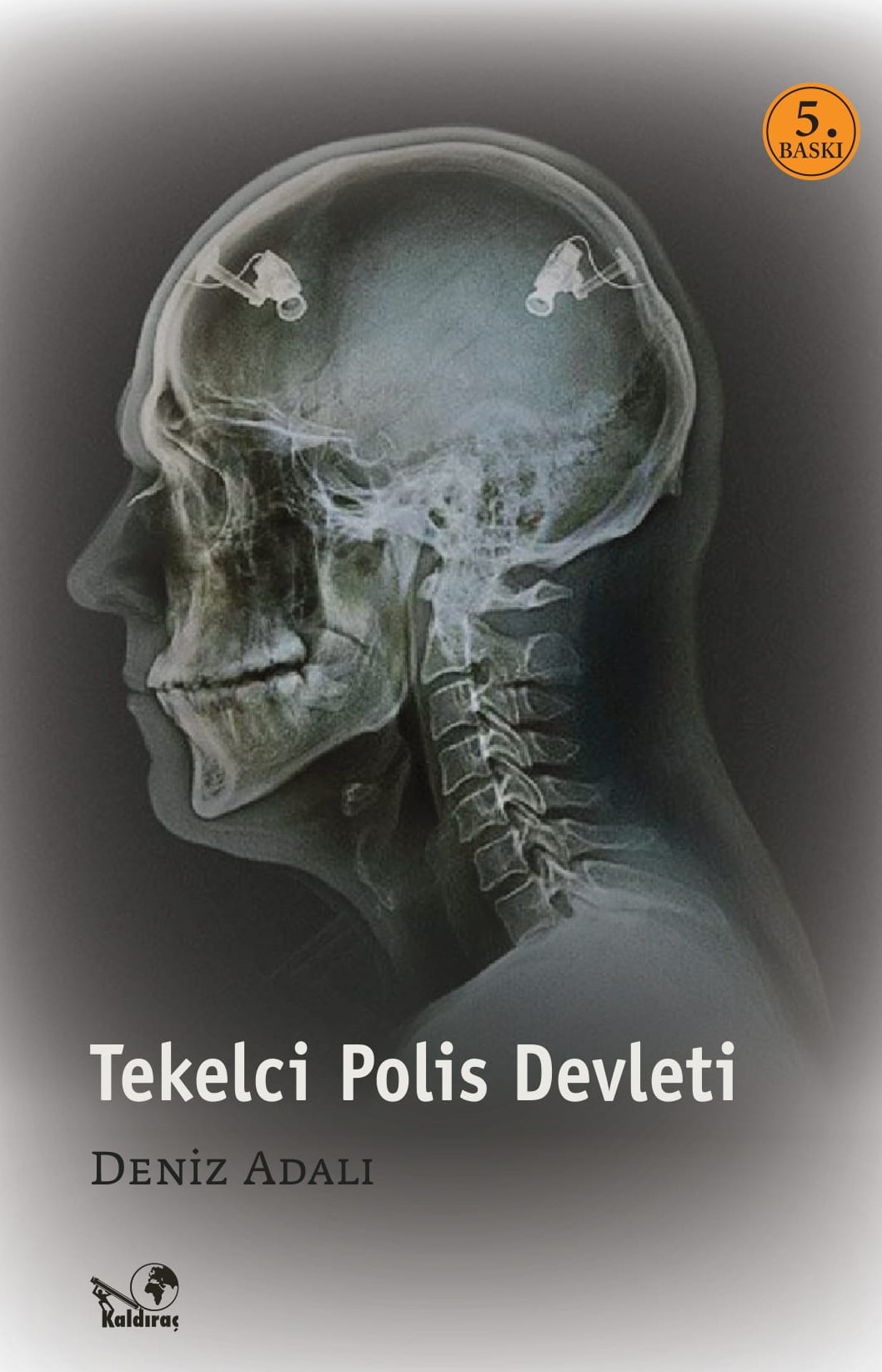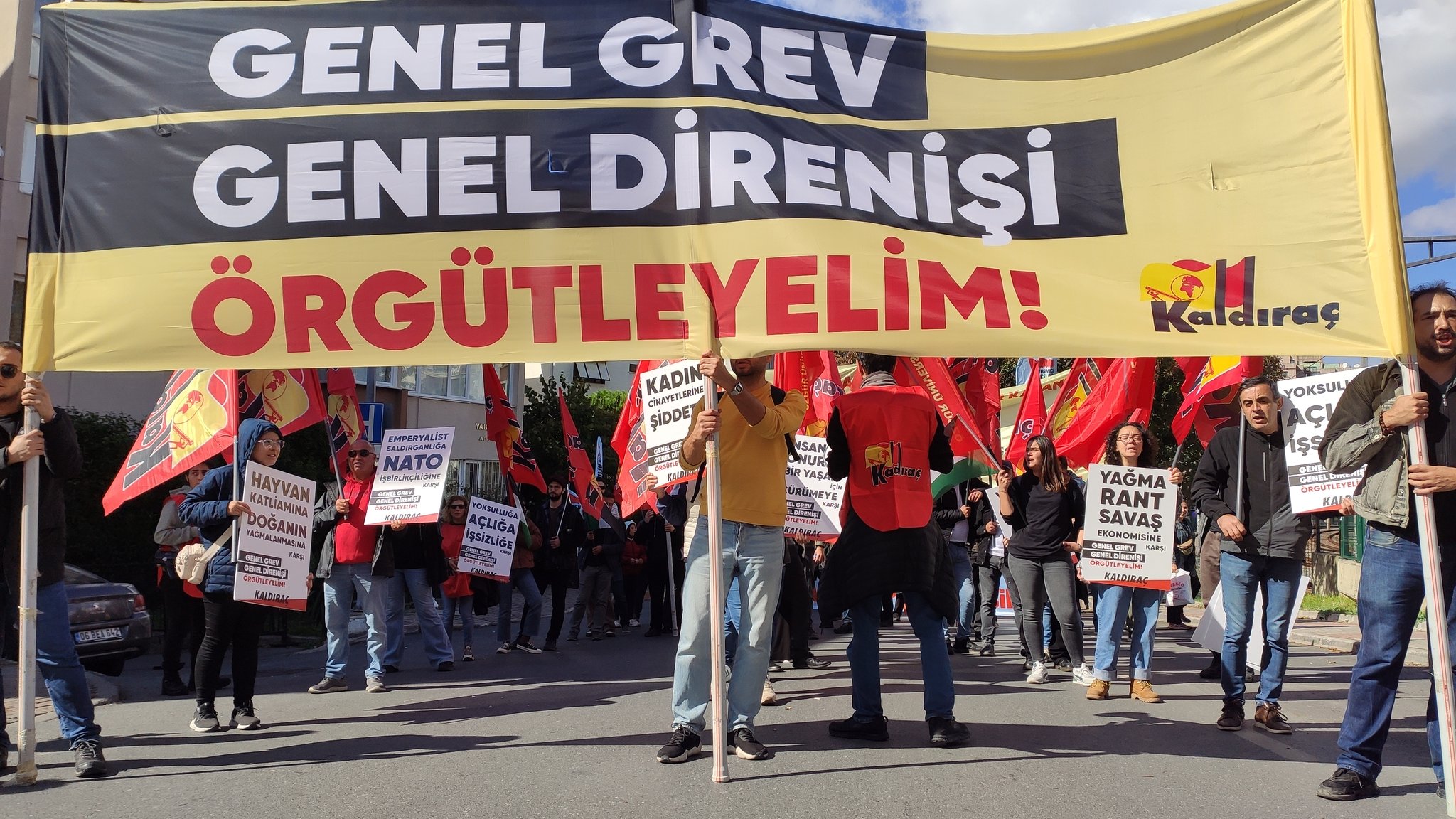In October 2024, Bahçeli, in an unexpected move from him, started shaking hands with the DEM Party parliament benches. This was a surprising move for many people. But it was clear from that moment that there was a search for a way in the background. It would not be an exaggeration to think that the owners of this search were NATO circles. It would not be enough to say the Turkish Republic without mentioning NATO. Bahçeli’s “mind”, Atasagun, should be considered together with NATO. There is no need to think about whether it is Bahçeli’s “courage” or NATO’s power. It is NATO’s power.
As time went by, Bahçeli’s statements developed as if someone was pushing him from behind (even if not every puppet is pushed from behind, it is played with strings). Bahçeli wanted Öcalan to speak in the DEM group in parliament and call for laying down arms and declaring the dissolution of the PKK. And in return, he spoke of the “right to hope.” For Öcalan, an important symbol for the Kurdish movement, to benefit from the “right to hope,” the conditions were (a) to lay down arms, (b) for the PKK to dissolve itself. But when it came to the PKK, it was said “unconditionally and unconditionally.” In other words, the state had conditions, but the PKK had to be unconditionally and unconditionally.
In fact, we considered these calls as a move by the state to catch the PKK off guard. We still think so. At the same time, trustee policies began to come into play more. So, while on the one hand the political space was being narrowed by trustee policies, and in that famous phrase, “while the democratic politics are being blocked,” on the other hand, a new dialogue was being adopted as if it would yield results at a more advanced level. These two attitudes were being explained as if they were the attitudes of the two wings of the state. They were also suitable for their own positions, and in this way, they were moves whose “credibility” had increased. Erdoğan is not very keen, so trustees are appointed, but the Bahçeli wing or the Atasagun wing seem to want “peace”. From a broader perspective, both are parts of the same process. Because the process involves violence on the one hand and hope for “peace” on the other.
The developments were carefully avoided from being called “process”. This was not just the state’s sensitivity. So it seems that the Turkish state was warned a lot about this issue.
I think it is possible to call it “peace dialogue”. Well, it should have a name. If everyone is talking about “peace”, let’s call it “peace dialogue”.
And this peace dialogue continued with the obligatory “interruption” of Öcalan’s isolation to some extent and through his meeting with DEM Party officials. The state’s talks with Öcalan must have started earlier, of course. But meeting with DEM Party officials or groups outside the state could mean “interruption” of the isolation. Otherwise, the isolation continues. It seems that it was not possible to reach PKK cadres by phone. Considering the Israeli-US assassinations targeting Hezbollah, it would be a mistake not to think that the PKK would be very cautious in this regard. Eventually, the letter came into play. And then, on February 27, Öcalan’s statement was published.
We are not in favor of making various comments on the details of this statement. We are not, because (a) the statement is not Öcalan’s statement alone and is within the limits permitted by the state, (b) after all, the call includes a call to “lay down arms and convene a congress to dissolve the PKK.” And we have nothing to say about this. This is a decision that a guerrilla movement of over 40 years will make on its own. Laying down arms and dissolving the PKK is already a call that leaves no room for interpretation.
Bourgeois politics is discussing whether there is a bargain. For us, there is no such discussion. There is not, because of course there must be a response to the PKK doing these things (if it is going to do so). This is an unconditional call propaganda, in fact a result of the state’s policy of keeping the talks secret. Moreover, if the PKK is going to lay down its arms and dissolve itself, the Turkish state will need to somehow address the consequences of this as a reality. In other words, the issue is, what will the state do now? The point that is open to interpretation is what the state will do, before the issue of what the PKK will do, as journalists argue.
We know that the Turkish state is clearly stating its own position. The impasse it is in has brought it to this point. And clearly, the policy of “either lay down your arms or perish” is in effect. Part of the policy called “strengthening the internal front” is to disarm the Kurds and make the Barzani line dominant within the Kurdish movement (Strengthening the internal front is not limited to this, of course. Strengthening the internal front is also related to destroying the developing resistance line. We know and experience how aggressive they are in this regard). This situation is not independent of the situation in the Middle East and the reflections of the sharing struggle on the region. It seems that the Turkish state is not taking any steps and wants to create the impression that only the Kurdish movement is laying down its arms and the PKK is dissolving itself. What they are saying openly is that those who do not comply will be destroyed. This is of course their plan. But there ıs never a rule that says the Kurdish movement will carry out this situation as they wish. The Kurdish movement, with its nearly 50-year history, has an accumulation of knowledge on this issue.
They mean NATO. In other words, this is a NATO plan. And the plan, frankly, is part of the plan to drag Turkey against Iran.
It should be assumed that the Kurdish movement and the PKK also know this, and they do. In this case, it is natural for the Kurdish movement to make various maneuvers considering the situation these new moves have brought before it. No one should expect the PKK to ignore this process. This would not be right. Of course, it is a difficult process. However, does seeing this process mean dissolving oneself and laying down arms? Of course not. We are not the ones who decide on this issue either.
In fact, the PKK has announced that it agrees with the content of Öcalan’s statements and will do what is necessary. A ceasefire is declared immediately starting from March 1. Now, it is necessary to see what the Turkish state will do. In fact, Öcalan has also emphasised the need to take the democratic steps required by the process. This section is emphasised outside the text. It seems that the state side has deemed it appropriate to explain this verbally without including this section in the text. After all, the PKK cannot convene its congress in one day. Besides, it is also doubtful that Öcalan will have a physical way of defending his views at this congress. So, instead of reading and interpreting between Öcalan’s lines, we need to interpret and see what the state will do.
Now, there is no point in us dwelling on the interpretation of this text. Various bourgeois segments have made very different interpretations on this issue. However, the call to lay down arms and dissolve the PKK is clear and unambiguous. You can evaluate it positively or negatively, but it is clear. It is asked whether this call is also made to the Kurdish movement in all four parts. This does not have much meaning. The text is clear and unambiguous. And the state side wants to expand the scope of this call with these discussions. Indeed, Bahçeli (actually Atasagun), who has not been seen around for a while, made a statement and said (a) the ceasefire is not enough, you will lay down your arms, (b) this call is “the call of the founding leader and includes all Kurdish groups.” So, one side of the talks clearly wants all Kurdish movements in Syria, Iran, Iraq and Turkey to lay down their arms. It seems that the Kurds in Syria are expected to take their arms and hand them over to the Turkish state. It seems that this is not only being said to Öcalan, it should also be said to the US. In short, if they all lay down their arms, then we will do our duty in the attack on Iran that is requested of us.
But new news came under the supervision of the US and it was announced that an agreement was signed between HTS and the SDF. Thus, the words of Atasagun, who spoke through the mouth of Bahçeli, who is not around, regarding the YPG laying down its arms, have no meaning anymore. Now, the YPG is dealing with the new regime in Syria. We do not know what this agreement will lead to, but we know that this move is a new state for the Republic of Turkey. And we know that no agreement is permanent during wartime.
The authorities of the Republic of Turkey are presenting their own positions with the emphasis on “a terror-free Turkey”, “strengthening the home front”, “either you lay down your arms or we will bury you”.
So what should we discuss? Should we interpret Öcalan’s text? No. How should the Kurds respond to this and what steps should they take? No, because it is too early for that. The process has not yet been clarified in all its aspects. But from our perspective, there is no such thing as a joint state for Turks and Kurds. Özgür Özel’s words, “I am raising my hand, I am promising the Kurds a state” cannot be taken as a basis. Furthermore, states are not and cannot be states of peoples, they are states of classes. Of course, it is not possible for us to discuss the assumption that the Kurdish people will act based on the words of Bahçeli, Atasagun, Erdoğan, Özgür Özel, etc. This process needs to be clarified. As a movement that sees every gain of the Kurds as a gain of the working class and the oppressed, it would not be right for us to discuss the process without clarification, based on assumptions and even on tendencies that have gained weight. Moreover, in a world war or war, alliances and agreements are very prone to break down.
So what should we discuss?
First, there is a situation of giving “peace” a chance. Whether this is real or the Turkish state is not sincere about this, it is not too much for anyone to want “peace” to be given a chance. We think that the Turkish state is not sincere about this issue and that NATO’s stance on this issue has always been clear and obvious.
In other words, it is not strange for the Kurdish movement or the Kurds and those who stand by them to talk about “peace”. Despite all the oppression and violence policies and massacre policies of the Turkish state, it does not make sense to criticise the Kurdish movement for talking about giving peace a chance.
If the issue is peace or giving peace a chance, the stance of the Turkish state can be criticised. The reason for the Kurdish problem is not the existence of the Kurdish people, but the policies of the Turkish Republic. The source of the problem is the policies of the sovereign. So, let it: let the sovereign take the steps he will take and let us see.
The second is the current situation of the Kurdish issue. It is possible to discuss this. It is known that the Kurdish movement encompasses 4 parts. Turkey has become a part of the PKK (Atasagun, sorry Bahçeli, when he says “founding leadership”, he actually accepts the leadership of the PKK) that abandoned the liberal and conciliatory line in the fields of Iran, Iraq, Syria and Turkey and turned to a revolutionary route. The Iraq War, that is, the process of the US invasion of Iraq, has led to the formation of a Kurdish autonomous region under the Barzani administration. The Syrian War has come to the point of the de facto formation of a new Kurdish area in Syria, primarily in Koban(?). It is possible to see the effect of the awakening line continuing in Turkey in both parts. The view that the PYD is an extension of the PKK in the Syrian field (the PYD is of course a different organisation, but it is inevitable that it will be influenced by the PKK) expresses this without the need for any other evidence. In reality, the movements in each part are movements with their own unique aspects.
The Kurdish issue was resolved in some ways in 1992, before Öcalan was arrested. The Kurdish awakening took place (national consciousness was formed) and the active support of the people was received. The reality of a people who resisted and fought for their freedom emerged. No matter what the legal framework in Turkey says, many social and cultural gains of the Kurdish people have emerged. Today, the level of liberation of Kurdish women is even further than this. The Kurdish identity finds its expression, no matter what the state says. No matter what the legal framework is, no one can treat Kurds the same way or belittle them. Yes, the legal framework for this had not emerged then. In a sense, the Kurdish issue was resolved in 1992 in the sense of a national awakening. Of course, not in the sense that there is no problem. But the movement has become massive, has become “popular”. In a narrow sense, this means the solution of the Kurdish issue. If we continue with old concepts, it can be called a democratic revolution. Of course, when the revolution takes power, it has come to a different place. But to say that the Kurdish problem has been solved in its original sense also expresses these deficiencies.
On the other hand, the conciliatory and collaborative line within the Kurdish movement has not remained as it used to be. While the Barzani line continues to exist, another national-liberal line is now evident apart from the Barzani line, which is nourished by the bourgeois-feudal understanding. This bourgeois liberal line, which is located between the Barzani line and the revolutionary line but is essentially the modern version of the Barzani line, has emerged. In this bourgeois liberal line, bourgeois thinking is more dominant than the bourgeois-feudal line in the classical Barzani line. This line is based more on the Kurdish middle classes. And of course, it also includes collaborators. It differs from the Barzani line in some respects. But still, in essence, it is possible to talk about two main lines. The Barzani line and the revolutionary line.
And when it comes to the solution of the Kurdish problem, it should not be forgotten that which classes this solution is in the interest of is of great and decisive importance. These two main lines do not stem from the characters of individuals, but from the situation of classes. If viewed in this way, these lines can be understood. And of course, these two lines are present in every part.
On the other hand, today, the Kurdish issue has gained a regional and even international dimension. Every major power, whether it is the US or the EU, has to include the Kurdish movement in its plans regarding the Middle East. While this situation shows the development of the Kurdish revolution on the one hand, on the other hand, it is also evidence that the process has become comprehensive and many new difficulties have emerged. The Kurdish movement has various representations almost everywhere in the world today. And it should also be emphasized that it has “confronted” very different forces in the region.
There are structures within the Kurdish movement that can be considered within the Barzani line by their essence, but also contain a different version. It should also be noted that compulsory or voluntary relations with the US have developed within international politics. It is possible to see these forces alongside revolutionary forces in the Syrian and Iraqi fields.
On the other hand, it should also be noted that the Kurdish resistance, despite all difficulties, has played a revolutionary role in the region and that the influence of those who maintain their revolutionary line continues.
Under all these conditions, it is not right to approach every development or contact that emerges negatively.
It must be admitted that the Kurdish movement has accumulated over the years and is expected to use this accumulation in different maneuvers.
The Kurdish movement has been one of the main agendas of political actors in our country for over 40 years. This is valid for bourgeois politics as well as the revolutionary workers’ movement. If the gains of the Kurdish movement were not in question, for example, an issue such as “education in the mother tongue” would not have reached its current state. This is a gain of all peoples. The solution of identity problems paves the way for the revolutionary workers’ movement.
Therefore, it is not right to underestimate the accumulation that the Kurdish movement has gained with evaluations such as “look, they have reached an agreement” in every new situation. It is not right to expect the Kurdish movement, which already carries heavy burdens on its shoulders, to do what it should do. Just because this is not the case, it is not right to look at every contact of the Kurds with the state as “look, they are compromising”.
Öcalan says “I take historical responsibility” and suggests that the PKK be dissolved and its arms be laid down. Of course, this is not a situation to be applauded by us. But as he says, the historical responsibility for this belongs to him. It is necessary to remain calm and look at the steps that the PKK will take. Instead of looking at the process only with “what the PKK will lose”, it is also necessary to look at it with the desire to see how much this process is affecting the Republic of Turkey. Öcalan, who has been declared a terrorist until now, is now being invited to the parliament by the MHP. This situation also shows that nationalism, one of the cornerstones of the ideology of the Republic of Turkey, has become obsolete. When we say “obsolete”, we do not mean that it has no role left. However, it is necessary to see that the effect of nationalism and religiousness is not in the old way.
So, will the Turkish Republic be able to take the necessary steps to solve this problem? We don’t think so. In fact, bourgeois experts, the bourgeois front, are turning to various discussions and interpretations such as who Öcalan’s statement covers in order to avoid this question. However, the source of the problem is the Turkish Republic and its practices. What they have been doing for years. This process has always existed since the Takrir-i Sükûn Law. What steps will the Turkish Republic take in the face of Öcalan’s statements? We recommend these “expert” journalists to discuss this issue.
Öcalan made his statement. How different segments of the Kurdish movement will evaluate this is their problem. The point we tirelessly want to emphasize is the fact that the Turkish Republic has always kept its massacre policies in effect. NATO has now entered the process differently. But this will not reduce the Turkish Republic’s interest in its massacre policies.
What NATO and the US want is clear: to establish a ground force for the war against Iran. In this context, preparations are being made for war against Iran through Israel and Turkey. This is no longer a secret. War against Iran is not an ordinary decision for the Republic of Turkey. It is difficult. By eliminating the resisting segments of the Kurds, by imposing a policy of annihilation on them, it is desired to make the Barzani line dominant in the Kurdish movement. It is thought that the war against Iran requires this. The ongoing war around the world has pushed US imperialism to make moves to prepare the roads passing through the Middle East in order to prevent China and Russia. It is known that this is openly discussed and has found a place among Kurdish experts. For this reason, there is a desire to make the Kurdish movement a part of these plans.
This is what they, the imperialist powers, want. And of course, it is not very difficult for the Republic of Turkey, which thinks it has the opportunity to annihilate the Kurds, to embark on this path. The difference between NATO and the Republic of Turkey is that the former wants to annihilate some Kurds, while the latter wants to annihilate all Kurds if possible.
Of course, we want the Kurdish revolution to be a part of the revolutionary resistance in the region. Our hearts are in favour of this. This is due to the interests of the workers’ movement in our region. But it should also be seen that we are not in a position to advise the Kurdish movement on this issue.
If the question asked to us in practice is “are you in favour of peace?”, of course we are in favour of peace. We are in favour of an honourable peace for the Kurdish people. If an honourable peace is possible without denying the path that has brought us to the present day, we are of course in favour of this. For this reason, we are in favour of explaining the fact that the Kurds are in favour of peace to the broadest masses of people. From this perspective, we find the DEM Party’s efforts to reach out to the people positive. We are also sure that the Turkish Republic or NATO do not want this, that is, an honourable peace. The peace plans of the rulers are fake and are merely expressions of submission to them in different words. If the rulers talk about peace, of course it means that they cannot govern with the old methods. But this does not mean that they cannot govern at all.
Let’s assume that the PKK has dissolved itself, so what is the Turkish Republic’s plan to solve the Kurdish problem? Will the “AKP-MHP fascism”, as the Kurds call it, become democratic? Let’s say that the obstacles to speaking Kurdish are eliminated (and despite the obstacles, this issue has been overcome), new laws are made on this issue, but how will Kurdish labourers and workers live? How will they be saved from exploitation?
The awakening that the Kurdish revolution has created among working and labouring Kurds cannot be eliminated by the games of the ruler. It should not be doubted that the rulers see this as much as we do. The trustee policies, the policies of violence and massacre imposed on the Kurds are proof of this. The rulers do not have the slightest idea of the Kurds’ attitude of not harming the process.
A war of imperialist sharing is ongoing in the world. This war has come to the fore due to the erosion of US hegemony. The war is between the five main imperialist powers, and these are the US, Germany, France, England and Japan. We have not forgotten countries such as Italy, Canada etc., we are only emphasising the 5 imperialist powers to say that their influence is in the background. These five imperialist powers want to overcome their crises by jointly defeating Russia and China and colonising them. The US has taken other imperialist powers behind itself through the ongoing war in Ukraine, which has come to a point with the clear defeat of the US and NATO today. In this respect, it has broken the will of the EU, especially Germany. But today, “peace” talks have started on Ukraine and the conflict between the five imperialist powers has started to come to the fore again.
One of the focal points of this sharing struggle is the Middle East, our region. And a socialist revolution is developing in our region amidst these war clouds. Of course, it will develop even more. Therefore, the internationalist unity of the revolutionary movements in our region is of great importance, as well as the internationalist unity of the world revolutionary movement. Countries such as Turkey, Iran and Egypt, where the working class is developed in our region, are of great importance for this developing socialist revolution. The victory of a socialist revolution that will develop in our region, no matter which part it is in, will rapidly affect the other parts. Today’s relatively small revolutionary forces will have great effects in this struggle. Therefore, the internationalist unity of all revolutionary forces is of great importance. And of course, the Kurdish revolutionary movement has important opportunities in this respect in many ways. The revolutionary movements in the entire region have the task of developing, rooting and strengthening revolutionary workers’ politics by removing it from outdated understandings. The working class has no homeland. This is true for our region in much more ways.
The only way out of the sharing struggle is the path based on the revolutionary line of the working class.


